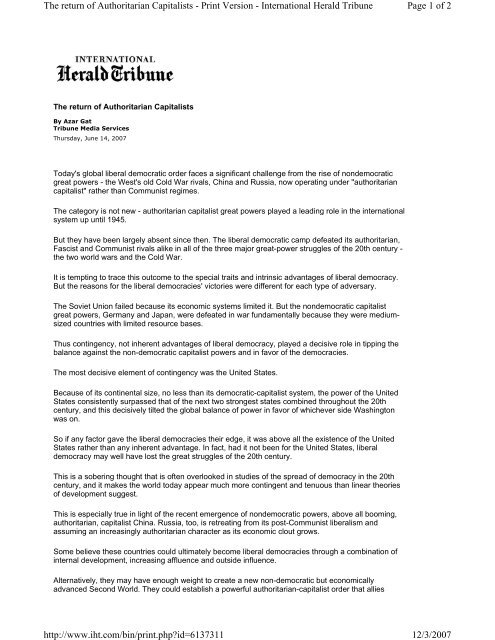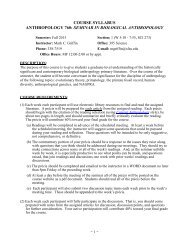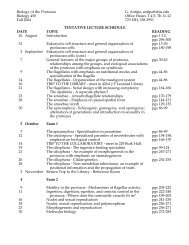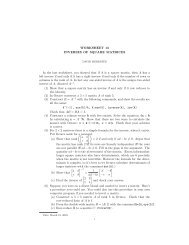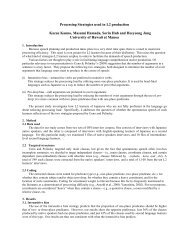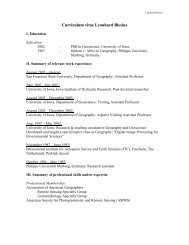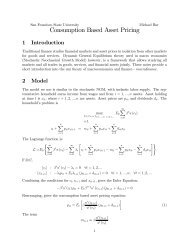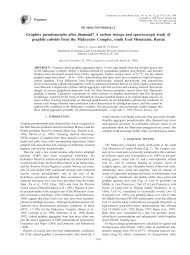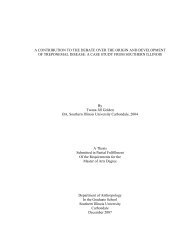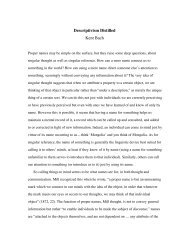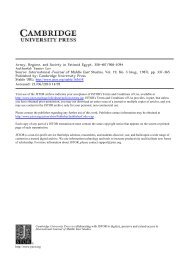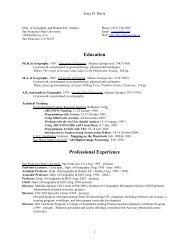The Return of Authoritarian Capitalism - Sfsu
The Return of Authoritarian Capitalism - Sfsu
The Return of Authoritarian Capitalism - Sfsu
Create successful ePaper yourself
Turn your PDF publications into a flip-book with our unique Google optimized e-Paper software.
<strong>The</strong> return <strong>of</strong> <strong>Authoritarian</strong> Capitalists - Print Version - International Herald Tribune<br />
http://www.iht.com/bin/print.php?id=6137311<br />
Page 1 <strong>of</strong> 2<br />
12/3/2007<br />
<strong>The</strong> return <strong>of</strong> <strong>Authoritarian</strong> Capitalists<br />
By Azar Gat<br />
Tribune Media Services<br />
Thursday, June 14, 2007<br />
Today's global liberal democratic order faces a significant challenge from the rise <strong>of</strong> nondemocratic<br />
great powers - the West's old Cold War rivals, China and Russia, now operating under "authoritarian<br />
capitalist" rather than Communist regimes.<br />
<strong>The</strong> category is not new - authoritarian capitalist great powers played a leading role in the international<br />
system up until 1945.<br />
But they have been largely absent since then. <strong>The</strong> liberal democratic camp defeated its authoritarian,<br />
Fascist and Communist rivals alike in all <strong>of</strong> the three major great-power struggles <strong>of</strong> the 20th century -<br />
the two world wars and the Cold War.<br />
It is tempting to trace this outcome to the special traits and intrinsic advantages <strong>of</strong> liberal democracy.<br />
But the reasons for the liberal democracies' victories were different for each type <strong>of</strong> adversary.<br />
<strong>The</strong> Soviet Union failed because its economic systems limited it. But the nondemocratic capitalist<br />
great powers, Germany and Japan, were defeated in war fundamentally because they were mediumsized<br />
countries with limited resource bases.<br />
Thus contingency, not inherent advantages <strong>of</strong> liberal democracy, played a decisive role in tipping the<br />
balance against the non-democratic capitalist powers and in favor <strong>of</strong> the democracies.<br />
<strong>The</strong> most decisive element <strong>of</strong> contingency was the United States.<br />
Because <strong>of</strong> its continental size, no less than its democratic-capitalist system, the power <strong>of</strong> the United<br />
States consistently surpassed that <strong>of</strong> the next two strongest states combined throughout the 20th<br />
century, and this decisively tilted the global balance <strong>of</strong> power in favor <strong>of</strong> whichever side Washington<br />
was on.<br />
So if any factor gave the liberal democracies their edge, it was above all the existence <strong>of</strong> the United<br />
States rather than any inherent advantage. In fact, had it not been for the United States, liberal<br />
democracy may well have lost the great struggles <strong>of</strong> the 20th century.<br />
This is a sobering thought that is <strong>of</strong>ten overlooked in studies <strong>of</strong> the spread <strong>of</strong> democracy in the 20th<br />
century, and it makes the world today appear much more contingent and tenuous than linear theories<br />
<strong>of</strong> development suggest.<br />
This is especially true in light <strong>of</strong> the recent emergence <strong>of</strong> nondemocratic powers, above all booming,<br />
authoritarian, capitalist China. Russia, too, is retreating from its post-Communist liberalism and<br />
assuming an increasingly authoritarian character as its economic clout grows.<br />
Some believe these countries could ultimately become liberal democracies through a combination <strong>of</strong><br />
internal development, increasing affluence and outside influence.<br />
Alternatively, they may have enough weight to create a new non-democratic but economically<br />
advanced Second World. <strong>The</strong>y could establish a powerful authoritarian-capitalist order that allies
<strong>The</strong> return <strong>of</strong> <strong>Authoritarian</strong> Capitalists - Print Version - International Herald Tribune<br />
http://www.iht.com/bin/print.php?id=6137311<br />
Page 2 <strong>of</strong> 2<br />
12/3/2007<br />
political elites, industrialists and the military; that is nationalist in orientation; and that participates in<br />
the global economy on its own terms, as imperial Germany and imperial Japan did.<br />
By shifting from Communist command economy to capitalism, China and Russia have switched to a<br />
far more efficient brand <strong>of</strong> authoritarianism. Although the rise <strong>of</strong> these authoritarian capitalist great<br />
powers would not necessarily lead to a non-democratic hegemony or war, it might imply that the neartotal<br />
dominance <strong>of</strong> liberal democracy since the Soviet Union's collapse will be short-lived and that a<br />
universal "democratic peace" is still far <strong>of</strong>f.<br />
Beijing and Moscow and their future followers might well become antagonists <strong>of</strong> the democratic<br />
countries - with all the potential for insecurity and conflict that this entails - while holding considerably<br />
more power than any <strong>of</strong> the democracies' past rivals ever did by virtue <strong>of</strong> being both large and<br />
capitalist.<br />
<strong>The</strong> most important counterweight remains the United States. For all the criticism leveled against it,<br />
the United States and its alliance with Europe stands as the single most important hope for the future<br />
<strong>of</strong> liberal democracy.<br />
As it was during the 20th century, the United States remains the greatest guarantee that liberal<br />
democracy will not be thrown on the defensive and relegated to a vulnerable position on the periphery<br />
<strong>of</strong> the international system.<br />
Azar Gat is pr<strong>of</strong>essor <strong>of</strong> national security at Tel Aviv University and the author <strong>of</strong> "War in Human<br />
Civilization." A longer version <strong>of</strong> this article appears in the July/August issue <strong>of</strong> Foreign Affairs.<br />
Notes:<br />
ADVERTISER LINKS<br />
American Express® Cards<br />
Great Card Offers from American Express. Compare and Apply Online!<br />
www.americanexpress.com<br />
Copyright © 2007 <strong>The</strong> International Herald Tribune | www.iht.com


